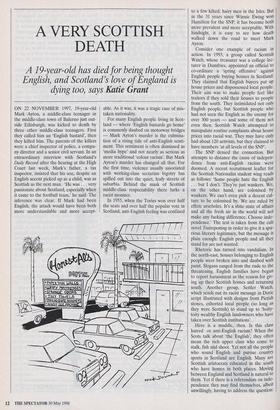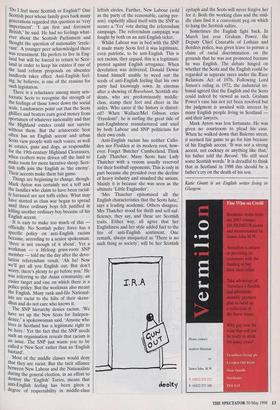A VERY SCOTTISH DEATH
A 19-year-old has died for being thought English, and Scotland's love of England is
dying too, says Katie Grant ON 22 NOVEMBER 1997, 19-year-old Mark Ayton, a middle-class teenager in the middle-class town of Balerno just out- side Edinburgh, was kicked to death by three other middle-class teenagers. First they called him an 'English bastard', then they killed him. The parents of the killers were a chief inspector of police, a compa- ny director and a senior civil servant. In an extraordinary interview with Scotland's Daily Record after the hearing at the High Court last week, Mark's father, a tax inspector, insisted that his son, despite an English accent picked up as a child, was as Scottish as the next man. 'He was . . very passionate about Scotland, especially when it came to the football team,' he said. The inference was clear. If Mark had been English, the attack would have been both more understandable and more accept- able. As it was, it was a tragic case of mis- taken nationality.
For many English people living in Scot- land — where 'English bastards go home' is commonly daubed on motorway bridges — Mark Ayton's murder is the culmina- tion of a rising tide of anti-English senti- ment. This sentiment is often dismissed as `media hype' and not nearly as serious as more traditional 'colour racism'. But Mark Ayton's murder has changed all that. For the first time, violence usually associated with working-class sectarian bigotry has spilled out into the quiet, leafy streets of suburbia. Behind the mask of Scottish middle-class respectability there lurks a racist monster.
In 1955, when the Tories won over half the seats and over half the popular vote in Scotland, anti-English feeling was confined to a few kilted, hairy men in the Isles. But in the 31 years since Winnie Ewing won Hamilton for the SNP, it has become both more prevalent and more acceptable. With hindsight, it is easy to see how death walked down the road to meet Mark Ayton.
Consider one example of racism in action. In 1993, a group called Scottish Watch, whose treasurer was a college lec- turer in Dumfries, appointed an official to co-ordinate a 'spring offensive' against English people buying houses in Scotland. They claimed that English buyers put up house prices and dispossessed local people. Their aim was to make people feel like traitors if they sold their houses to people from the south. They intimidated not only English people, but Scottish people who had not seen the English as the enemy for over 300 years — and some of them not even then, Scottish Watch attempted to manipulate routine complaints about house prices into racial war. They may have only had about 120 activists, but they claimed to have members 'at all levels of the SNP'.
The SNP denied the connection. But attempts to distance the cause of indepen- dence from anti-English racism were doomed. A recent recruitment leaflet for the Scottish Nationalist student wing reads as follows: 'Some people hate the English . . . but I don't. They're just wankers. We, on the other hand, are colonised by. wankers. We can't even pick a decent cul- ture to be colonised by. We are ruled by effete arseholes. It's a shite state of affairs and all the fresh air in the world will not make any fucking difference. Choose inde- pendence.' The text is taken from the cult novel Trainspotiing in order to give it a spu- rious literary legitimacy, but the message is plain enough: English people and all they stand for are not wanted.
Rhetoric has turned into vandalism. In the north-east, houses belonging to English people were broken into and daubed with paint. Slogans ranged from the rude to the threatening. English families have begun to report harassment as the reason for giv- ing up their Scottish homes and returning south. Another group, Settler Watch, which sends out its racist message in Doric script illustrated with designs from Pictish stones, exhorted local people (so long as they were Scottish) to stand up to 'hoity- toity wealthy English landowners who have taken over Scottish institutions'.
Here is a muddle, then. Is this class hatred or anti-English racism? When the Scots talk about 'the English', they often mean the rich upper class who come to stalk, fish and shoot. Yet not all the people who sound English and pursue country sports in Scotland are English. Many are Scottish aristocrats educated in the south who have homes in both places. Moving between England and Scotland is natural to them. Yet if there is a referendum on inde- pendence they may find themselves, albeit unwillingly, having to address the question: `Do I feel more Scottish or English?' One Scottish peer whose family goes back many generations regarded this question as 'very impertinent', 'I am first and foremost British,' he said. He had no feelings what- ever about the Scottish Parliament and thought the question of nationality 'irrele- vant'. A younger peer acknowledged there was resentment. He prefers to live in Eng- land but will be forced to return to Scot- land in order to keep his estates if one of the land reform proposals on absentee landlords takes effect. Anti-English feel- ing, he believes, is one of the reasons for such legislation.
There is a reluctance among many aris- tocratic Scots to recognise the strength of the feelings of those lower down the social scale. Landowners point out that the Scots ghillies and beaters earn good money from sportsmen of whatever nationality and that the Highland estates could not survive without them. But the aristocratic Scot often has an English accent and urban Scots view people with such voices, as well as estates, guns and dogs, as responsible for the 19th-century Highland Clearances, when crofters were driven off the land to make room for more lucrative sheep. Scot- tish toffs join the English as 'the enemy'. Their accents make them fair game.
Things are beginning to change, though. Mark Ayton was certainly not a toff and the families who claim to have been racial- ly harassed are not toffs either. What may have started as class war began to spread until three ordinary boys felt justified in killing another ordinary boy because of his English accent.
It is easy to make too much of this officially. No Scottish police force has a specific policy on anti-English racism because, according to a senior spokesman, `there is not enough of it about'. Yet a workman — a lifelong grass-roots SNP member — told me the day after the devo- lution referendum result, `Ah ha! Now we'll get all you English out. But don't worry, there's plenty to go before you.' He was referring to the Asian community, an easier target and one on which there is a police policy. But the workman also meant the English. Many rank-and-file National- ists are racist to the hilts of their skene- dhus and do not care who knows it.
The SNP hierarchy denies racism. 'We have set up the New Scots for Indepen- dence,' a spokeswoman said. 'Anyone who lives in Scotland has a legitimate right to be here.' Yet the fact that the SNP needs such an organisation reveals that racism is an issue. The SNP just wants you to be Called a 'New Scot' rather than an 'English bastard'.
Most of the middle classes would deny that they are racist. But the tacit alliance between New Labour and the Nationalists during the general election, in an effort to destroy the 'English' Tories, means that anti-English feeling has been given a degree of respectability in middle-class leftish circles. Further, New Labour (sold as the party of the reasonable, caring per- son) explicitly allied itself with the SNP to secure a 'Yes' vote during the referendum campaign. The referendum campaign was fought by both on an anti-English ticket.
Whilst Labour was in bed with the SNP it made many Scots feel it was legitimate, even patriotic, to be anti-English. This is not racism, they argued, this is a legitimate protest against English arrogance. When devolution was delivered, Donald Dewar found himself unable to weed out the seeds of anti-English feeling that his own party had knowingly sown. In cinemas after a showing of Braveheart, Scottish stu- dents, who are predominantly middle- class, stamp their feet and cheer in the aisles. Who cares if the history is distort- ed? When Wallace/Mel Gibson cries `Freedom!', he is surfing the great tide of anti-Englishness manufactured and used by both Labour and SNP politicians for their own ends.
Anti-English racism has neither Cullo- den nor Flodden at its modern root, how- ever. Forget 'Butcher' Cumberland. Think Lady Thatcher. Many Scots hate Lady Thatcher with a venom usually reserved for their football opponents. This is only in part because she presided over the decline of heavy industry and smashed the unions. Mainly it is because she was seen as the ultimate 'Little Englander'.
`Mrs Thatcher epitomised all the English characteristics that the Scots hate,' says a leading academic. Others disagree. Mrs Thatcher stood for thrift and self-suf- ficiency, they say, and these are Scottish traits. Either way, all agree that her Englishness and her style added fuel to the fire of anti-English sentiment. One remark, always misquoted as 'There is no such thing as society', will be her Scottish epitaph and the Scots will never forgive her for it. Both the working class and the mid- dle class find it a convenient peg on which to hang the Scottish saltire.
Sometimes the English fight back. In March last year Graham Power, the Deputy Chief Constable of Lothian and Borders police, was given leave to pursue a claim of racial discrimination on the grounds that he was not promoted because he was English. The debate hinged on whether the Scots and the English could be regarded as separate races under the Race Relations Act of 1976. Following Lord Simon's ruling in 1972, the industrial tri- bunal agreed that the English and the Scots could indeed be viewed as such. Graham Power's case has not yet been resolved but the judgment is awaited with interest by many English people living in Scotland and their lawyers.
Mark Ayton was less fortunate. He was given no courtroom to plead his case. When he walked down that Balerno street, it seemed fair game to go for him because of his English accent. 'It was not a strong accent, not cockney or anything like that,' his father told the Record. 'He still used some Scottish words.' It is dreadful to think that in Scotland in 1998 this should be a father's cry on the death of his son.
Katie Grant is an English writer living in Glasgow.



































































 Previous page
Previous page